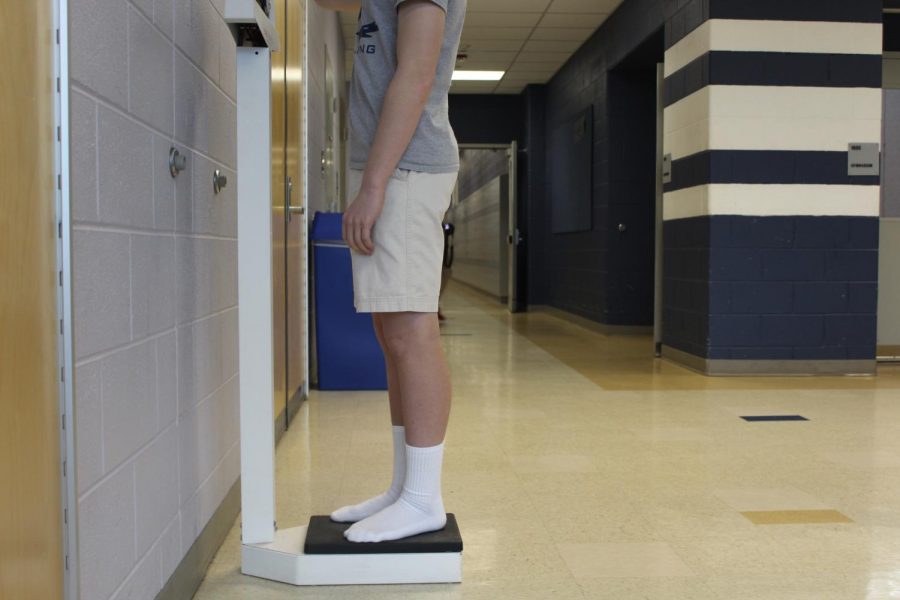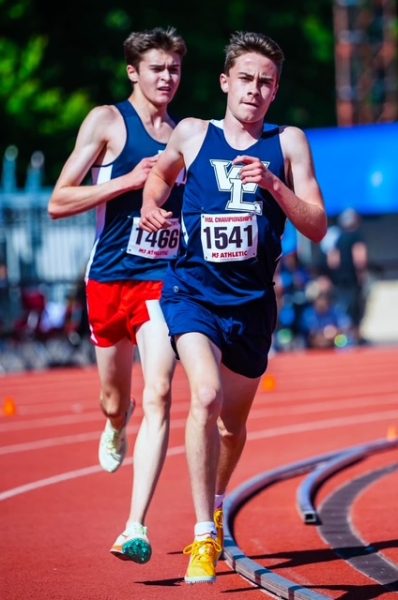Wrestling with the truth
Wrestling often requires athletes to meet certain weight goals to ensure optimal success when competing, and it is not uncommon for wrestlers to attempt to drop pounds before a meet. With the proper diet and training, losing weight can be done healthily over a long period of time. However, some wrestlers attempt to this in only a few days, and in some cases, in just a few hours.
The school makes an effort to ensure its wrestlers are healthy. In fact, at the start of every season, wrestlers are required to take a hydration test. If the student passes the hydration test, they step on the scale for a weigh in. Once their body mass index (BMI) is determined, that and the hydration test results are used to calculate the lowest weight a wrestler can healthily meet during the season.
The Virginia High School League (VHSL) then regulates how much weight the wrestlers are allowed to lose per week to meet their goals in order to prevent some of the extreme measures wrestlers have been known for taking.
“Us coaches, if a kids weighs in below what the state says they are allowed to weigh that week, get in trouble and the kid is not allowed to compete that day,” varsity coach Daniel Morreale said. “Now, obviously, we can’t go home and feed them or ensure that they have a proper diet plan, which is where you get a lot of the spitting in water or last minute weight cuts.”
Some wrestlers on the school’s team can be seen spitting into water bottles during class and not eating lunch in order to lose weight before competitions and weigh-ins. Wrestlers have admitted to wearing multiple layers of clothing to school as well as partaking in extreme workouts throughout the day to sweat out as much water weight as possible.
Water weight, for the most part, leaves the body quickly, which is why some athletes may focus on dehydrating themselves when under a time constraint. However, dehydration can cause fatigue, dizziness, cramping and heatstroke, all things that would hinder an athlete’s abilities.
One, now sophomore wrestler on the school’s team, reportedly lost eight pounds in just one day utilizing dehydration techniques paired with extreme workouts his freshman year. However, this does go against advice from a fellow teammate. “Being extremely dehydrated only results in feeling light headed and out of focus, which can be detrimental in wrestling,” junior wrestler of four years Shahriar Rayhan said.
Outside of school, some wrestlers are limiting their caloric intake in order to slim down. A gradual decrease in calories is generally healthy if done properly and at a safe rate, but with so much pressure to meet weight requirements, this can be a challenge.
Losing unhealthy amounts of weight in a short amount of time can cause a number of problems, including muscle loss, hair loss, fatigue headaches and other more serious long-term medical conditions like anemia.
Likewise, if an athlete is not getting the proper nutrition, they may also struggle to focus on schoolwork and homework, thus also affecting their ability to compete. According to the Activities Office without a C average, student athletes cannot participate on a sports team.
“[Cutting weight] really affects your ability to concentrate just because of a lack of food. During the season, I would eat at least one-to-two small meals,” sophomore wrestler Michael Zuppas said. “Cutting weight is by choice and it just helps me gain a competitive advantage.”
According to the Health and Human Services and United States Department of Agriculture (HHS/USDA) Dietary Guidelines for Americans in 2010, teenage boys ages 14 to 18 need anywhere from 2,000 to 3,200 calories depending on their activity level. According to 15-year-old, 5’9 and 145-pound sophomore wrestler Anthony Lawson, who has cut out snacks and desserts from his diet, his average meal consists of, “a small amount of protein, almonds and stuff, some fruit like blueberries and vegetables like spinach and then a glass of water.”
If Lawson was eating just one serving of each of the foods he listed at every meal three times a day, that adds up to be 675 calories. Based on Lawson’s height, weight, age and activity level, he needs around 2,743 calories, an average taken from three different calorie calculator websites.
Even with the evidence against improper and extreme weight loss at a young age, the wrestlers see their weight as something within their control.
Morreale shared his own personal experience with losing weight when he was a senior in order to avoid competing against two twins, both of whom had previously beat him. He then had the choice to maintain his weight or lose a significant amount of weight to avoid competing in the same weight class as either of the twins. He ended up losing more than ten pounds in order to switch classes.
“No matter what I did, I wrestled all offseason, I knew I was not going to beat them, so the one thing I could control was my weight class,” Morreale said. “I made the choice to go down to 103 [pounds] to avoid them. It was miserable. My mom told me that I wasn’t allowed to speak the entire winter because I was so angry [due to hunger].”
It is not that the wrestlers necessarily desire to be unhealthy, but it can sometimes be the only accessible option under a time crunch. Although there are generally good intentions for their weightloss, hyperfocusing on the scale number can lead to an obsessiveness over weight and eating disorders, which can take a toll both mentally and physically on the athlete.
Rayhan admitted to spitting into water bottles and using saunas to lose weight when he first started out. He has since discovered better techniques to make his class. “With advice from the coaches, I’ve transformed my diet with foods that contain few calories with high nutritional value in order to lose weight over a long period of time,” Rayhan said. “I’ve realized that it’s much better for my performance, and I’m not going back to the old school methods.”
According to the coach and the team’s upperclassmen, the freshman and sophomores are the main users of unhealthy weight loss techniques because they haven’t learned the proper means to slim down. “We do not encourage these [unhealthy] methods of losing weight, and as the older guys in the room, we hope to inspire them to do it correctly,” Rayhan said.
All sports come with risks, and when it comes to wrestling, this can mean unhealthy or extreme weight loss. However, the wrestling team and coaches hope that people see their sport as more than the pounds they are dropping.
“Sometimes people just look at the sport and hyperfocus on weight loss which has the wrestlers do the same. People say some of them spit in cups or they don’t look healthy [losing weight], but at the end of the day, they have gotten rid of weight they didn’t necessarily need,” Morreale said. “My goal is to set them up for success across the board, so find the ideal weight class for them to wrestle, help them get down there the right way and ensure that they maintain their success in school as well.”








